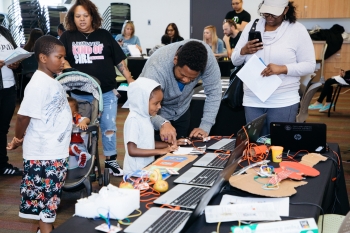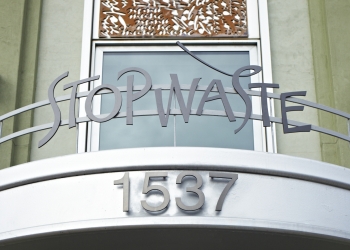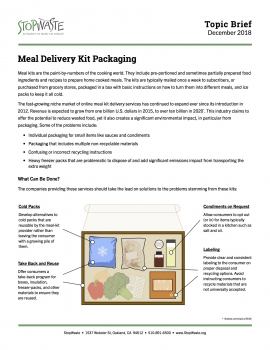Resource Library
- Reports
 Topic Briefs
Topic BriefsStopWaste’s member agencies are working towards achieving significant reductions in greenhouse gas (GHG) emissions by 2030 and beyond. Through their climate action plans, local governments are increasingly addressing the upstream emissions from the production of goods used locally but produced elsewhere.
Read More- News | 02/21/2019
Landscape pros: Attend this free event to learn practical solutions to California's most pressing water issues.
Read More  Topic Briefs
Topic BriefsEndorsing a circular economy approach to waste reduction means moving away from recycling as the answer to managing materials, and moving to reusable items instead of single use and/or recyclable items. Reuse is considered “upcycling,” or extending the life of an item in its same form with minimal processing.
Read More- News | 01/17/2019
On January 16, the American Council for an Energy-Efficient Economy, a national nonprofit based in Washington, D.C., recognized the Bay Area Regional Energy Network’s (BayREN) Multifamily program with an Exemplary Program Award as one of America’s outstanding energy efficiency programs.
Read More  Success Stories
Success StoriesE-waste is one of the fastest growing segment of the waste stream – in 2018, the amount of worldwide e-waste generation was expected to increase to 49.8 million tons. Only a small percentage gets refurbished or recycled, which means the rest ends up in landfill, burned, or illegally traded.
Read More- News | 01/15/2019
While the holidays are often a time of abundance, particularly when it comes to food, they are also a time when many face an increase in food insecurity, particularly children who rely on school cafeterias for their next meal.
Read More  News | 01/11/2019
News | 01/11/2019In December 2018, StopWaste, via its Waste Management Authority Board, adopted a new set of Guiding Principles which will help guide programmatic strategy and budget development through 2021.
Read More Topic Briefs
Topic BriefsMeal kits include pre-portioned and sometimes partially prepared food ingredients and recipes to prepare home cooked meals. The kits are typically mailed once a week to subscribers, or purchased from grocery stores, packaged in a box with basic instructions on how to turn them into different meals, and ice packs to keep it all cold.
Read More